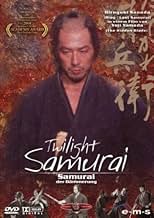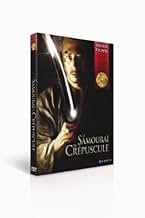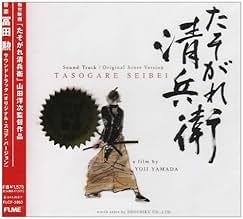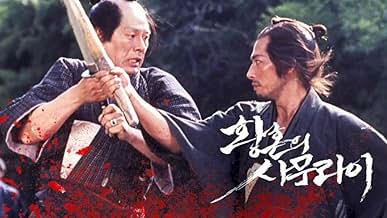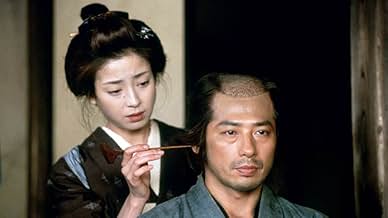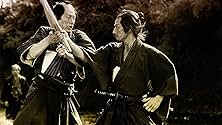Alors que l'ère féodale du Japon tire à sa fin, un samouraï veuf éprouve des difficultés à trouver un équilibre entre les loyautés du clan, deux jeunes filles, une mère âgée et la réappariti... Tout lireAlors que l'ère féodale du Japon tire à sa fin, un samouraï veuf éprouve des difficultés à trouver un équilibre entre les loyautés du clan, deux jeunes filles, une mère âgée et la réapparition soudaine de son amour d'enfance.Alors que l'ère féodale du Japon tire à sa fin, un samouraï veuf éprouve des difficultés à trouver un équilibre entre les loyautés du clan, deux jeunes filles, une mère âgée et la réapparition soudaine de son amour d'enfance.
- Réalisation
- Scénario
- Casting principal
- Nommé pour 1 Oscar
- 38 victoires et 9 nominations au total
Avis à la une
The crux of the film is the relationship between personal honor and social honor. Iguchi is indeed a most honorable man. He truly loves his children and his senile mother, and sacrifices his dignity and station to care for them. He works from dawn to dusk, attending his duties with the court by day and working on his farm by night, somehow finding time to also sell handmade insect/bird cages just to help his family get by. He does all this even though it soon becomes apparent that he has no equal as a swordsman, and in that right alone deserves the respect of those who deride him. We come to understand that selfless sacrifice is the single greatest act of honor, especially when one can still consider himself a blessed man. However, the personal honor that Iguchi wields even more skillfully than his sword becomes at odds with the social honor that his status as a samurai calls for. This conundrum is the heart of almost every scene in the film, and reaches its peak as the story moves toward its climax. Though Iguchi tells his best friend that he would gladly surrender his status as a samurai to become a simple farmer, he finds himself unable to resist his call to duty under the code of the samurai. He knows that to be honorable in his duty as a samurai, he must compromise his honor as a man. How can he kill a man to fulfill the unjust motives of his clan, especially when the man he is fighting is so much like himself?
The direction of the film is beautifully impressionist. Yamada crafts pictures of everyday life which gives us an inherent understanding of the life of Iguchi. In one scene, he sits dejectedly on his doorstep after coming home in the rain, lamenting the holes in his socks while his squire stands outside in the downpour. In another, he quietly applies his perfectionism to the construction of his cages in his dark and dirty living room while his family sleeps. In yet another, he shares a meal with his family as they laugh and enjoy each other's company. Yamada's eye for imagery, in combination with his patient and subtle storytelling, are reminiscent of great impressionist directors such as Ozu, Tarkovsky, and Malick. There are many other memorable images in this film, many of which depict the duality of nature. In one scene we see soldiers learning to fire rifles under the spring buds of a lotus tree. In another we see men fishing along a sapphire blue river, with golden fields behind them and a stunning, snow-capped Mount Fuji on the horizon-- and the bodies of starved peasant children floating down the river.
This is a great film. See it.
Sanada plays Seibei Iguchi, a poor, 50-koku ranked samurai who has to support his two daughters and a senile mother, due to the passing away of his wife. The structure and plot turns of the story are simple, but fascinating to watch unfold, and it is perhaps the simplicity and novelistic grace of the narrative that makes the film so remarkable. Seibei works as a scribe with his fellow samurai, and always has to rush home after work to attend to his duties as a father. He lets hygieine slowly slide into second priority (resulting in rather unkempt clothes and socks), but in general, he doesn't seem to care: his two daughters he treasures above all other things. When a woman named Tomoe, a childhood friend that Seibei was particularly fond of, suddenly re-appers into his life, Seibei makes certain decisions that he ultimately ends up regretting later. The rest of the story is full of very interesting plot develoments, playing with the audience's expectations (especially with the relationship between Tomoe and Seiebi), and although the film is not a traditional samurai film in that it does not have alot of action scenes, the composition of the tale, and its "storytelling" invocation (one of the daughters narrates) is good enough to keep you watching.
Hiroyuki Sanada playing Seibei is really a marvel to watch; he adds a very sensible depth and modesty to the character, and infuses it with some understated comic acting as well. At the end of the film, after the climatic final battle, Sanada is able to make the character of Seibei resonate with a very unconventional but nonetheless strong and beautiful heroism. Sanada is really a very talented thespian, and in this film, you may get to sample the sheer range of his great technique. For the world-class acting work he did in this film, he won a Japanese Academy Award, and the film also got noticed by the Oscars (nominated for Best Foreign Language Film, 2004). If there's a chance your able to catch this film in a local theatre (usually, it plays at Landmark) do so, you won't regret it. You'll be able to watch an excellent story unfold, and also see some of the finest acting in world cinema today.
I've never been much of a fan of samurai movies, or any other kind of movies that glorify the facile wholesale slaughter of other human beings. So this movie was a real breath of fresh air in how it showed the real place that such samurai fighting occupied in that bygone era in Japan.
But the real star of this film is Seibei himself, his daughters, and his love, Tomoe. And their story is so real, so believable, so moving, it was just incredible.
It's a real shame that this title does not seem to be available on video or DVD in the US. This is one title I'd really like to add to my library.
Le saviez-vous
- AnecdotesOfficial submission of Japan for the 'Best Foreign Language Film' category of the 76th Academy Awards in 2004.
- GaffesWhile Seibei fighting with Toyotaro, Toyotaro katana fell on the ground, right beside Seibei. Toyotaro fell towards river and Seibei make step forward towards Toyotaro, so the katana clearly should stay behind Seibei, beyond possibility to reach by Toyotaro. But from different camera can be seen that katana lay between both of them, 2 meters ahead of Seibei. It's most likely intentional arrangement by director, otherwise Toyotaro wouldn't be able to made his last attempt to grab katana.
- Citations
Kayano Iguchi: Father, If I learn to do needlework someday I can make kimonos. But what good will book learning ever do me?
Seibei Iguchi: Well, it probably won't ever be as useful as needlework. But you know, book learning gives you the power to think. However the world might change, if you have the power to think you'll always survive somehow. That's true for boys and for girls. All right?
Kayano Iguchi: Yes.
- ConnexionsFeatured in The 76th Annual Academy Awards (2004)
- Bandes originalesKimerareta Rhythm
Performed by Yosui Inoue
Meilleurs choix
- How long is The Twilight Samurai?Alimenté par Alexa
Détails
- Date de sortie
- Pays d’origine
- Sites officiels
- Langue
- Aussi connu sous le nom de
- The Twilight Samurai
- Lieux de tournage
- Sociétés de production
- Voir plus de crédits d'entreprise sur IMDbPro
Box-office
- Budget
- 5 000 000 $US (estimé)
- Montant brut aux États-Unis et au Canada
- 559 765 $US
- Week-end de sortie aux États-Unis et au Canada
- 8 573 $US
- 25 avr. 2004
- Montant brut mondial
- 7 372 769 $US
- Durée2 heures 9 minutes
- Couleur
- Mixage
- Rapport de forme
- 1.85 : 1
Contribuer à cette page



